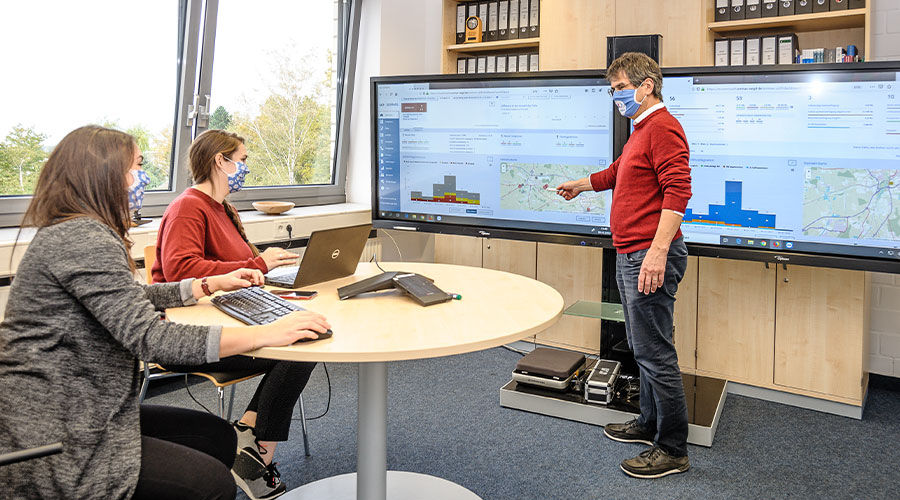| My Research Interest in RESIST |
Our epidemiological research focus in RESIST is on mobile and electronic Health. Acute infectious diseases such as acute respiratory infections have a particularly high impact on population health. For example, influenza causes the highest burden compared to other infectious disease in Europe measured in disability-adjusted life years and can lead to severe outcomes particularly in the elderly.
Hence, we aim at researching acute transient infections, their risk factors and, potentially, sequels using PIA, an eResearch System named “Prospective Monitoring of Acute Infections”–App (www.info-pia.de: website for participants) initiated by us and developed under our guidance, to be used in population-based research cohorts. Specifically, we want to investigate immunological markers or microbiota composition patterns as risk factors or predictors for acute infectious diseases.
PIA has the potential to ideally represent a vital application for data collection on acute infections in the population-based cohort of RESIST and, as such, offers a complementing aspect not yet covered.
Prof. Krause at a meeting
Prof. Dr. Gérard Krause – Curriculum Vitae
Current Position
Degrees
Previous positions
ECDC and WHO related scientific advice experience (excerpt)
Other scientific advice experience (excerpt)

10 Selected Publications (of > 188 original publications)
Yinka-Ogunleye A, Aruna O, Dalhat M, Ogoina D, McCollum A, Disu Y, Mamadu I, Akinpelu A, Ahmad A, Burga J, Ndoreraho A, Nkunzimana E, Manneh L, Mohammed A, Adeoye O, Tom-Aba D, Silenou B, Ipadeola O, Saleh M, Adeyemo A, …, Krause G, Ihekweazu, C (2019) Outbreak of human monkeypox in Nigeria in 2017-18: a clinical and epidemiological report. The Lancet Infectious diseases 19: 872-879
Horn J, Hoodgarzadeh M, Klett-Tammen CJ, Mikolajczyk RT, Krause G, Ott JJ (2018) Epidemiologic estimates of hepatitis E virus infection in European countries. The Journal of infection 77: 544-552
Ott JJ, Horn J, Krause G, Mikolajczyk RT (2017) Time trends of chronic HBV infection over prior decades – A global analysis. J Hepatol 66: 48-54
Schweitzer A, Akmatov MK, Krause G (2017) Hepatitis B vaccination timing: results from demographic health surveys in 47 countries. Bulletin of the World Health Organization 95: 199-209G
Krause G (2017) Changing Infection Patterns. Deutsches Ärzteblatt international 114: 849-850
Mehraj J, Witte W, Akmatov MK, Layer F, Werner G, Krause G (2016) Epidemiology of Staphylococcus aureus Nasal Carriage Patterns in the Community. Curr Top Microbiol Immunol 398: 55-87
Karo B, Krause G, Hollo V, van der Werf MJ, Castell S, Hamouda O, Haas W (2016) Impact of HIV infection on treatment outcome of tuberculosis in Europe. AIDS 30: 1089-98
Schweitzer A, Horn J, Mikolajczyk RT, Krause G, Ott JJ (2015) Estimations of worldwide prevalence of chronic hepatitis B virus infection: a systematic review of data published between 1965 and 2013. Lancet 386: 1546-55
Rübsamen N, Castell S, Horn J, Karch A, Ott JJ, Raupach-Rosin H, Zoch B, Krause G, Mikolajczyk RT (2015) Ebola risk perception in Germany, 2014. Emerging infectious diseases 21: 1012-8
Fähnrich C, Denecke K, Adeoye OO, Benzler J, Claus H, Kirchner G, Mall S, Richter R, Schapranow MP, Schwarz N, Tom-Aba D, Uflacker M, Poggensee G, Krause G (2015) Surveillance and Outbreak Response Management System (SORMAS) to support the control of the Ebola virus disease outbreak in West Africa. Euro Surveill 20


